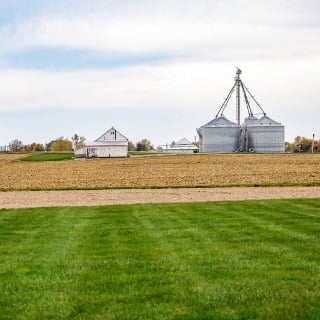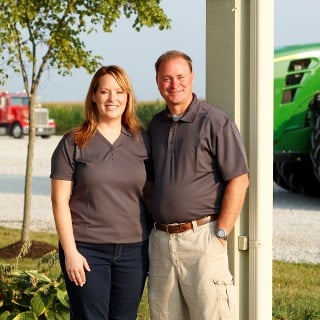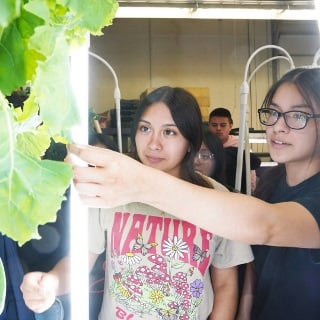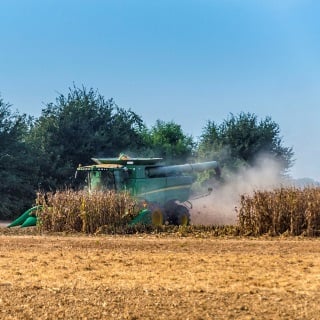Nobody knows the value of an education better than Hunter Watson. The young farmer spent five years working as a school teacher before returning to agriculture. While shaping young minds was what he thought he wanted, farming kept calling.
Like many young producers, farming is just in his genes—Hunter’s grandparents had a cattle operation and he grew up on a poultry farm. As a kid, he was close to his parents and siblings, completing chores around the farm that contributed to the family’s success. When you work for your family’s livelihood, you quickly learn the importance of follow-through and teamwork. After growing up this way, he knew he wanted to raise his children with the same values that had been instilled in him through farming: hard work, integrity and responsibility. So Hunter and his wife, Katharine, purchased a poultry farm from a mutual friend and started their lives as farmers.
Nobody knows the value of an education better than Hunter Watson. The young farmer spent five years working as a school teacher before returning to agriculture. While shaping young minds was what he thought he wanted, farming kept calling.
Like many young producers, farming is just in his genes—Hunter’s grandparents had a cattle operation and he grew up on a poultry farm. As a kid, he was close to his parents and siblings, completing chores around the farm that contributed to the family’s success. When you work for your family’s livelihood, you quickly learn the importance of follow-through and teamwork. After growing up this way, he knew he wanted to raise his children with the same values that had been instilled in him through farming: hard work, integrity and responsibility. So Hunter and his wife, Katharine, purchased a poultry farm from a mutual friend and started their lives as farmers.
Learning on the job
When the Watsons first purchased their farm, the barns came equipped with solar panels. At the time, Hunter knew next to nothing on how to manage a full solar program for his operation. But he quickly learned everything he could once he realized that the technology cuts his total electricity bill by over one-third. And the learning process doesn’t end there. Hunter spends a great deal of his time reading everything he can about anything related to agriculture – from technology like solar panels to making small adjustments that can make a big impact.
“I read all the time,” says Hunter. “I look up things constantly on how I can save energy even by doing something small like tightening up the chicken houses in ways I never would have thought. I’m always eager for new information.”
After the success of his solar program, Hunter kept researching other improvements he could make to his operation. He recently applied for a grant to switch his operation’s lightbulbs to LED. It’s another cost-saving measure and a way Hunter is always on the lookout for opportunities. He sees farming as an occupation that truly demands an open mind to seek out new information.
“Everybody knows that the game – no matter what business you’re in – is always changing,” says Hunter. “The willingness to change with it and grow with it helps farmers more than anything else.”
More continued education
Hunter is always seeking more information to keep up with the constantly changing game. This year to help him on his path to learning, he attended Farm Credit Mid-America’s Know to Grow program. The series of four conferences throughout Tennessee, Kentucky, Indiana and Ohio focus on providing farmers under the age of 35 with financial education and tools to help them succeed. While he was thrilled for the opportunity, he wasn’t sure what to expect. “I thought Know to Grow would be like attending just another college class where we would get lectured on our finances,” he says. “But everybody was very upbeat and both days felt full of possibility.”
The Know to Grow conferences have a varied curriculum, ranging from developing a business plan to a breakout session about the performance of the current livestock market. The goal of the program is to help young farmers today, setting them up for success tomorrow. Hunter, in particular, was impressed with the networking opportunities he found with other young farmers. “It was great listening to other farmers and hearing their struggles. We’re all in the same boat, we’re trying to grow our farm and do right by our families. It’s really unfortunate, but it’s harder and harder for people to get into agriculture. Education—whether that’s a mentor, online articles or a conference—is like a coach to help people establish their farms and grow their businesses.”
“Our farm is our legacy; it’s something that’s ours,” continues Hunter. “I have a lot of pride because it’s mine. I started it on my own, but I know I need to keep learning from other people to make sure it grows.”






